Neuropathy refers to a condition characterized by damage or dysfunction of the peripheral nerves, which are responsible for transmitting signals between the central nervous system (the brain and spinal cord) and the rest of the body. Neuropathy is caused by conditions including diabetes, infections, traumatic injuries, autoimmune diseases, and exposure to certain toxins. As a consequence of nerve damage, individuals with neuropathy often experience a range of symptoms such as pain, tingling, numbness, and weakness in the affected areas.
Neuropathy can significantly impact a person's quality of life, affecting mobility and daily activities. Neuropathy is more than painful - it's also stressful, bothersome, and all-encompassing. It causes both men and women to become reclusive, depressed, and unable to enjoy life. If you're suffering from neuropathy, you might feel like all hope is lost. But the team at Texas Nerve and Spine are here to help.
Neuropathy relief in Houston General, TX, is more achievable than you might think, and it doesn't need to involve harmful surgeries or addictive pain medications.
At our nerve and spine clinic in Houston General, TX, we have a simple philosophy: Treat every patient the same way that you would treat your parent, spouse, or child if they were patients at Texas Nerve and Spine. As a family-owned and operated institution, that's just the way we do business. While some spine and nerve pain clinics focus solely on monetary transactions and ROI, we prefer to put our patients' needs first before anything else. And that, in a nutshell, is what sets Texas Nerve and Spine apart from all the others.
We supplement our patient-first philosophy with innovative neuropathy therapies. Our therapies restore our patients' health while correcting the underlying causes of their nerve issues without relying on damaging pharmaceutical drugs or expensive, invasive surgeries.
It all starts with our unique Brain to Body system - a cutting-edge approach developed specifically for people with chronic pain and nerve diseases. This system helps treat patients suffering from a wide range of conditions, including:
If you're in search of lasting relief and world-class therapies for neuropathy, our team is here to serve you.
To reverse neuropathy, areas of the body that have become weak due to disease or injury must be restrengthened. This encompasses your brain, nerves, muscles, blood vessels, and cells. Our experts at Texas Nerve and Spine developed the most advanced chronic pain and neuropathy therapy system to do all of this and more, and we call it the Brain to Body System.
From chemotherapy-induced peripheral neuropathy and extremity numbness to diabetic neuropathy and sciatica, our Brain to Body System helps restore your health and corrects the causes of your problems. Unlike treatments from other nerve and spine clinics, our system provides long-term relief without relying on invasive surgeries or dangerously addictive pharmaceutical medications.
To understand how our Brain to Body System solves chronic pain and similar conditions like nerve disease, you need a basic knowledge of the conditions themselves. That way, you can understand why so many who suffer from them rarely improve.

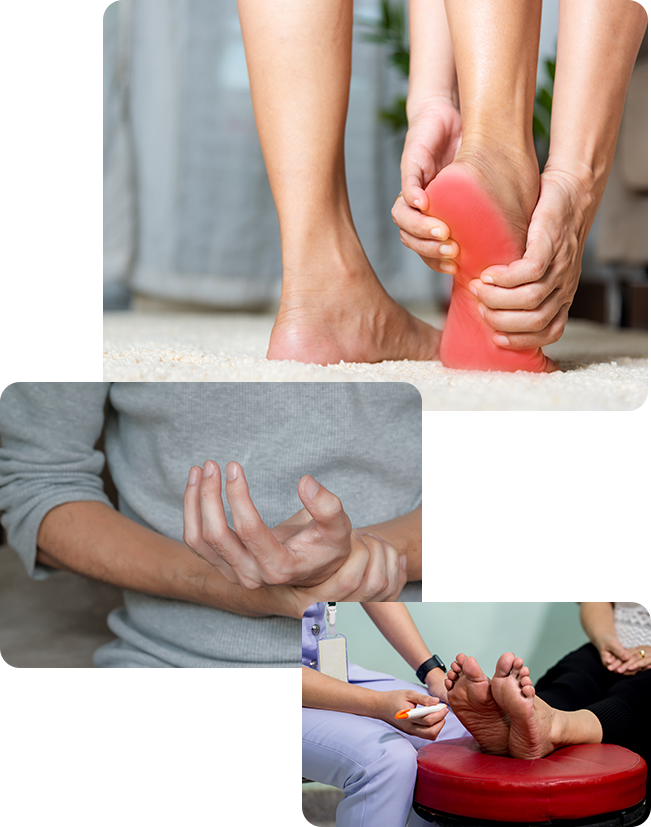
Neuropathy is nerve damage that causes pain, numbness, and burning in the extremities. This is a type of condition that does not get better on its own and it doesn't alleviate after the use of traditional medical treatments or prescription pain meds.
Pain from neuropathy causes a domino effect; it starts with inflammation, leading to decreased blood supply. This reduction in blood supply results in a lack of oxygen. When your body doesn't get enough oxygen, it loses crucial nutrients that your body needs. This progressive effect often leads to long-term problems such as:
But with our Brain to Body Strengthening System, patients suffering from neuropathy build strength through rehabilitation. This advanced system helps:
Our Brain to Body System is central to our approach to neuropathy relief in Houston General, TX. By following our system, we can provide several services to patients suffering from neuropathy.

Breathing in higher levels of oxygen helps to improve your health. Exercise with Oxygen Therapy is a technique that increases oxygen circulation at a more rapid pace than oxygen therapy alone.
At Texas Nerve and Spine, our doctors use the NuStep Recumbent Cross Trainer. This specialized machine trains your muscles, brain, and nerves to work together, which supports your body's whole healing processes. While using the NuStep Recumbent Cross Trainer, patients are hooked up to an oxygen generator to enjoy the benefits of EWOT and reach their neuropathy relief goals.
When you oxygenate your blood with EWOT, it can have amazing benefits that can:
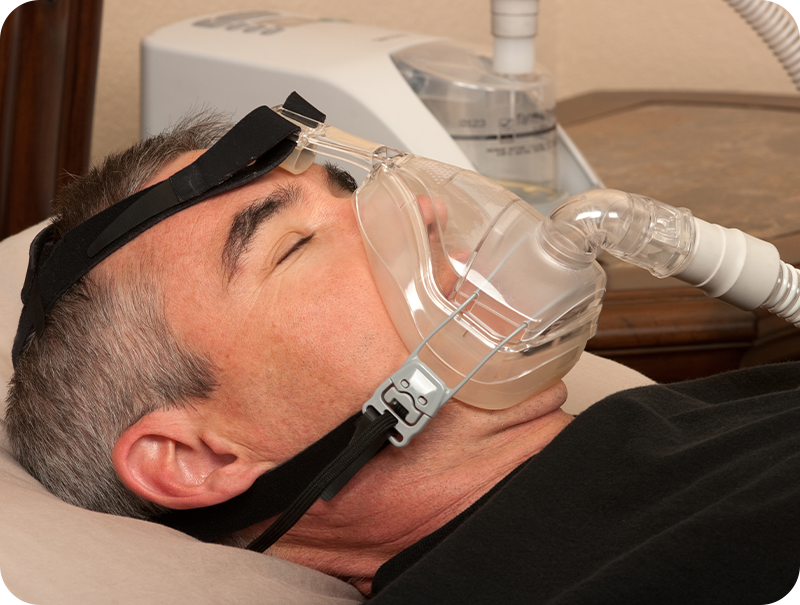


Many patients who visit Texas Nerve and Spine are suffering from neuropathy, due to spinal issues. This requires specialized kind of care from highly trained doctors. If you're in search of a safe, gentle, controlled treatment for nerve and spinal pain, Flexion Distraction therapy may be for you.
Finding relief for this type of condition and pain is often easier said than done. Fortunately, relief is right around the corner at Texas Nerve and Spine. Our Flexion/Distraction Table stretches the spine safely and gently, allowing injured tissue and damaged discs the chance to heal and become hydrated, which lets the affected area recover more effectively and efficiently, while taking the pressure off the nerves that cause the neuropathy.
Patients looking for neuropathy relief in Houston General, TX choose Flexion/Distraction therapy because it:

With more than 20 million people in the U.S. suffering from neuropathy, it makes sense that most of them want a solution that does not require pain medication or invasive surgery. That's where laser therapy from Texas Nerve and Spine comes into play. Laser therapy has been used for therapeutic purposes in medical environments for years. In fact, it is FDA-approved and backed by more than 2,500 research studies, which have demonstrated its efficacy in neuropathy relief in Houston General, TX.
Though laser therapy is a common treatment option, not all lasers are the same. Our Class IV laser therapy, used in all applicable programs, is the most efficacious and powerful laser available for tissue healing and regeneration and healing. Class IV lasers use photobiomodulation, which provides excellent results for Musculoskeletal disorders. This process has also been proven to help with other various conditions that cause chronic pain, such as sciatica, carpal tunnel syndrome, low back pain, shoulder pain, and much more.
Our chronic pain patients choose laser therapy from Texas Nerve and Spine because it:
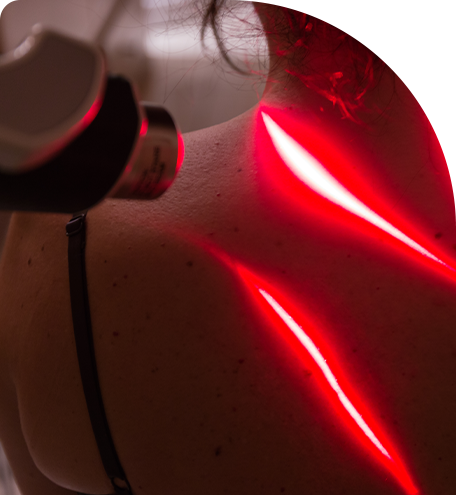


When your motor functions are limited or non-existent from neuropathy, it can ruin your life. You lose the ability to be independent - one of the hallmarks of being human. Fortunately, with Motor Function Retraining Therapy at Texas Nerve and Spine, patients suffering from neuropathy related motor function issues have a light at the end of the tunnel. This type of specialized physical therapy helps people recover from neuropathy that leaves their motor functions lacking. The goal of Motor Function Retraining Therapy is to regain coordination and strength.
Motor Function Retraining Therapy is a crucial part of the motor function rehabilitation process because it helps patients regain the independence they lost. It helps patients return to their original level of motor function or better.
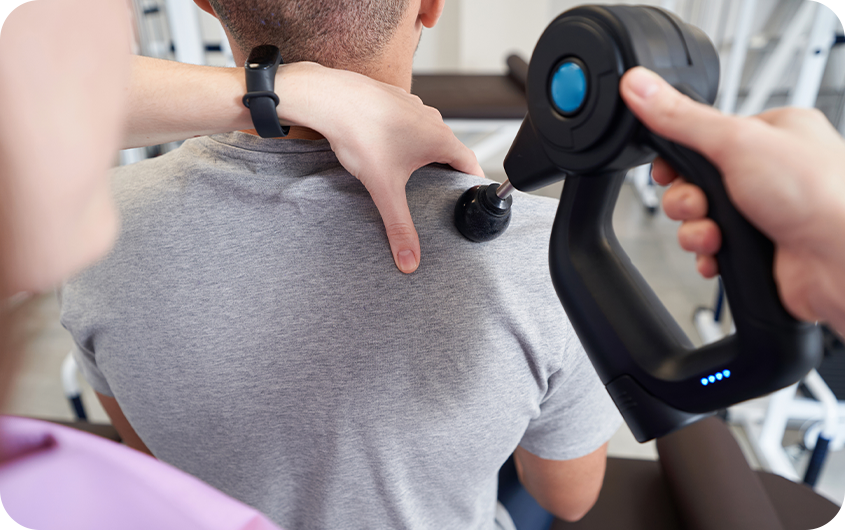
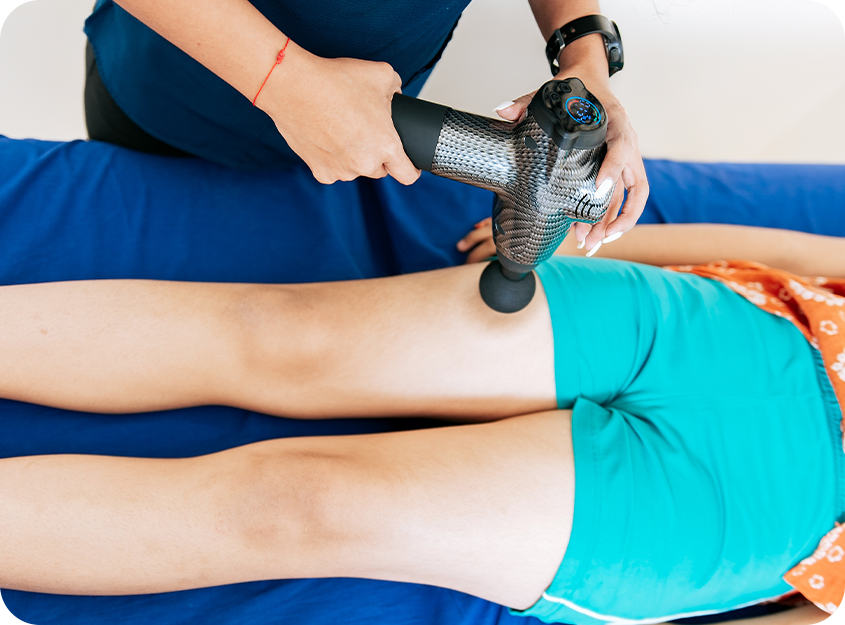
Based on our Brain to Body Strengthening System, our experts design custom exercise programs based on the patient's needs. We may also use electrical stimulation and other modalities for more effective sessions and recovery.
Motor Function Retraining Therapy provides many benefits, including:


Myofascial Release Therapy gives patients neuropathy relief in Houston General, TX, and boosts mobility by loosening tight muscles. There are similarities to traditional massages, however, Myofascial Release Therapy focuses on soft tissues and the muscular system in your body to relieve tension and stress on muscles.
Tight muscles have reduced blood flow and less oxygen, leading to restricted movement and intense pain. Our system uses state-of-the-art technology to apply acute, high-velocity vibration directly to the affected tissue to provide the patient with the environment necessary to increase mobility and reduce pain.
Benefits of this type of therapy include:

When the nerves are weakened, due to neuropathy, pain develops, inflammation increases, and blood flow decreases. If you're searching for a safe, effective way to deal with painful spine related nerve issues Neuro Impulse Therapy may be a great option for neuropathy relief in Houston General, TX. Unlike common chiropractic therapies, this advanced therapy does not involve any "cracking" or significant adjustments.
Any type of injury can cause dysfunction and weakness in your brain. To improve cognition and the neurological connection between the brain, the muscles, and the nerves, some injured patients choose to undergo Interactive Neurocognitive Therapy using our Neuro Activation Wall. This wall retains, strengthens, and restores proper function to the brain and nervous system without relying on medications or invasive therapies.
Neuro Impulse Therapy works by using very specific impulses directed at the area causing pain. These targeted impulses send a signal to your body so that it can begin healing and repairing your body naturally.
Texas Nerve and Spine patients choose Neuro Impulse Therapy because it:
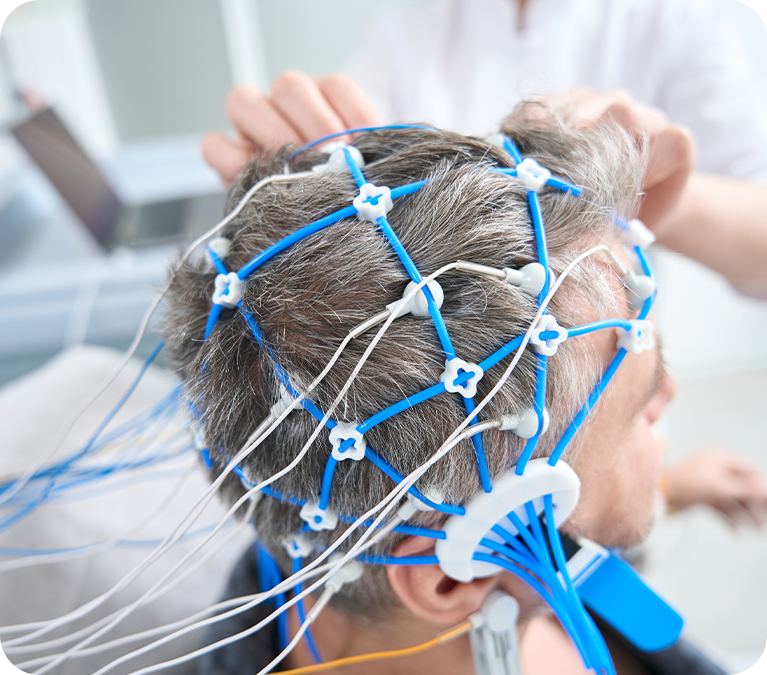
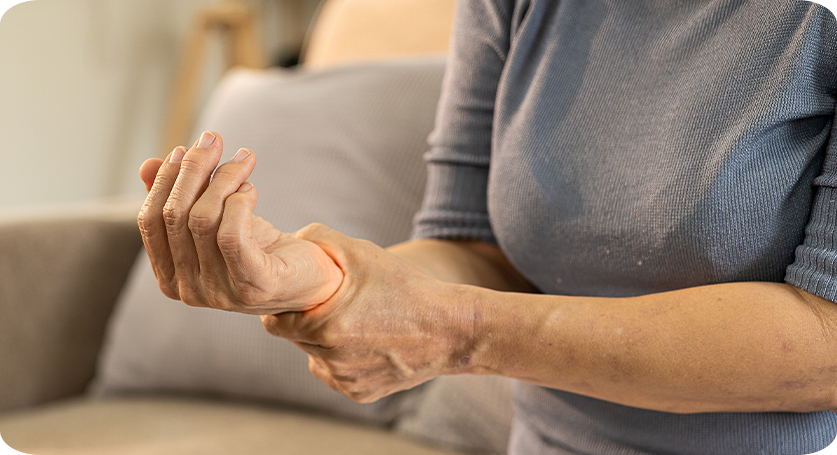
Peripheral neuropathy occurs when there is a lack of blood flow to the nerves in areas like your feet and hands. When these nerves are devoid of blood, they begin to decay and degenerate because they don't have enough oxygen or nutrients. Eventually, the nerves in your body shrivel up, causing pain, numbness, balance problems, and other painful symptoms.
Our Brain to Body program works wonders for neuropathy issues like these by using state-of-the-art technology like laser therapy and personalized, strategic plans of action created around our patient's needs. If you're looking for both short and long-term pain relief from peripheral neuropathy, this could be the solution you need.
Spinal conditions that cause neuropathy range in severity from bearable to crippling. To get to the bottom of your spine conditions, our team uses X-Rays to pinpoint the location of your spine's disease. From there, we craft a custom rehabilitation program that addresses the underlying causes of your pain and neuropathy.


Spinal decompression works by gently stretching the spine. When the spine is stretched, it changes its position. This change relieves pressure off the discs in your spine, which act as cushions in your back. By creating negative pressure, herniated and bulging discs retract, giving the nerves and structures in your back relief. This relief sends nutrient-rich fluids and oxygen to the discs so they can heal properly.
Neuropathy can be debilitating. But it doesn't have to be permanent. Your journey to a neuropathy-free life starts with a simple four-step process at Texas Nerve and Spine:

At Texas Nerve and Spine, our doctors understand that true neuropathy relief in Houston General, TX, won't happen until we can uncover its underlying cause(s). Our specialists will perform detailed exams and review your medical history to understand the full scope of your condition.

Once we have discovered the underlying reasons for your neuropathy, it's time to begin healing. Our team will work together to craft a personalized treatment plan to provide long-term relief for your neuropathy.

Our team has the experience and resources to provide you with your plan of care. This plan will be based on your needs and our Brain to Body Strengthening System, giving you the relief you deserve - naturally.

Neuropathy relief cannot be accomplished without a tested system and a purpose-driven team that supports your recovery. That's why our expert staff will assess your journey to recovery and be there for support every step of the way. Because when you are a patient at Texas Nerve and Spine, you're never alone.
Sign up for The Brief, The Texas Tribune’s daily newsletter that keeps readers up to speed on the most essential Texas news.The Texas Supreme Court has sided with former top deputies of Attorney General Ken Paxton and cleared the w...
Sign up for The Brief, The Texas Tribune’s daily newsletter that keeps readers up to speed on the most essential Texas news.
The Texas Supreme Court has sided with former top deputies of Attorney General Ken Paxton and cleared the way for their whistleblower lawsuit to move forward.
The all-Republican Supreme Court on Friday rejected Paxton’s request to dismiss the lawsuit after the case had been on pause pending a possible settlement with the whistleblowers. The decisions came four days after the whistleblowers asked the court to reinstate the case — and about two weeks after Paxton was acquitted in his impeachment trial before the Texas Senate.
The lawsuit will return to a Travis County trial court.
"We are looking forward to obtaining a trial setting and to preparing this case for trial as soon as possible,” the whistleblowers' lawyers said in a statement.
Four whistleblowers sued the attorney general's office in 2020 for wrongful termination and retaliation after they reported Paxton to the FBI, alleging he abused his office to help a friend and donor, Nate Paul. They almost settled with the attorney general’s office for $3.3 million earlier this year — until Texas House investigators, concerned about using taxpayer dollars for the settlement, started probing the lawsuit’s claims and recommended Paxton’s impeachment.
The series of events effectively froze the case at the Texas Supreme Court. But on Monday, the whistleblowers held a news conference to announce that they were asking the high court to jump start their case in light of Paxton’s acquittal.
“The political trial is over, and it’s time for the case to return to a real court,” whistleblower Blake Brickman said Monday.
Paxton’s office declined to comment on the news conference, saying only that its lawyers would respond in court. But it appears they did not file a reply prior to Friday’s ruling.
Brickman is a plaintiff in the lawsuit with three other former Paxton deputies: Ryan Vassar, David Maxwell and Mark Penley. The four fired deputies testified as prosecution witnesses at Paxton’s impeachment trial.
The Supreme Court provided no explanation for its decision Friday, noting only that Paxton’s petition for review was denied with Justice Evan Young not participating.
The case reached the Texas Supreme Court in early 2022, after a state appeals court and the trial judge rejected pretrial attempts by Paxton’s agency to dismiss the lawsuit.
The Texas Whistleblower Act protects state workers from retaliation by other employees for reporting potential crimes to law enforcement. Paxton has argued his agency acted properly because it has the right to fire employees “at will” and because the whistleblower law does not apply to Paxton because he is an elected official, not a “public employee.”
“Like the Governor, the Lieutenant Governor, and members of this Court, he is an elected officer, chosen by the people of Texas to exercise sovereign authority on their behalf,” Paxton’s office said in its petition for review to the Supreme Court.
Paxton’s office did not immediately respond to a request for comment on Friday’s ruling.
Independent Texas reporting needs your support. The Texas Tribune delivers fact-based journalism for Texans, by Texans — and our community of members, the readers who donate, make our work possible. Help us bring you and millions of others in-depth news and information. Will you support our nonprofit newsroom with a donation of any amount?
Learn about The Texas Tribune’s policies, including our partnership with The Trust Project to increase transparency in news.
Apply for benefits as soon as you are unemployed or your work hours are reduced. Your claim starts on the Sunday of the week you apply for benefits. Do not apply until after your last workday. We cannot pay benefits for weeks before you became unemployed.If you worked in a state other than Texas, you need to apply for benefits in that state. If you worked in more than one state, you may be able to combine two or more state claims into one claim. See ...
Apply for benefits as soon as you are unemployed or your work hours are reduced. Your claim starts on the Sunday of the week you apply for benefits. Do not apply until after your last workday. We cannot pay benefits for weeks before you became unemployed.
If you worked in a state other than Texas, you need to apply for benefits in that state. If you worked in more than one state, you may be able to combine two or more state claims into one claim. See If You Earned Wages in More than One State.
If your last job was for a temporary agency or staff leasing company, you have additional requirements you must meet before you can apply for benefits:
See If Your Last Work was Temporary Employment to learn how temporary work affects your benefits.
You must provide your:
When you sign up for online services, you will select a User ID and password. If you have a User ID and password from WorkInTexas.com, you can use that to log on to Unemployment Benefits Services.
Your Personal Identification Number (PIN) is a four-digit number you choose. Use your PIN to confirm your identity on Unemployment Benefits Services and Tele-Serv.
For more information about User IDs and Passwords, see:
Your password and PIN protect your identity and privacy. They have the same legal authority as your signature on a paper document. Do not give your password or PIN to anyone, not even to a family member or TWC employee. You are responsible for any payment request made using your User ID and password or PIN.
User ID and Password Requirements:
When you apply for benefits, TWC offers you one of two ways to get your benefit payments:
TWC will deposit payments to the TWC debit card account unless you sign up for direct deposit.
If you signed up for direct deposit on a past claim, TWC will use the account information you provided then. If that account is closed or has changed, update your direct deposit information or you may not receive your benefit payments.
To select or change your payment option online or by phone:
To set up direct deposit, you will need:
For information about payment options, see:
Unemployment Benefits Services (UBS) is TWC’s free online system that allows claimants to access their Unemployment Benefits information. You can use the Internet to apply for benefits, estimate your benefits, update your claim, request payments, check your status, change your payment option, and more.
Our Tele-Serv automated phone system is available at 800-558-8321. Claim status and payment request options are available daily, 7:00 a.m. to 6:00 p.m. Central Time. General information is available anytime.
You can access any of our UBS online systems through the above logon link or you can continue reading on this page for information about our services, how to use UBS, and related user guides.
If you have an unemployment benefits claim, you can sign up for Electronic Correspondence for online access to your unemployment benefits correspondence.
Electronic Correspondence allows you to receive most, but not all, of your unemployment notices and forms electronically in a secure, online mailbox. You are responsible for regularly checking your online inbox, regardless of whether you receive an email notifying you of new mail. All Electronic Correspondence documents are also available as accessible versions for visually impaired customers.
Once you sign up, you will continue to receive most of your TWC correspondence electronically until you opt out. You must opt out to stop receiving documents by Electronic Correspondence and return to paper mail. For more information, see the user guide below.
If you have applied for unemployment benefits, view your claim and payment information:
We update our systems nightly, so consider checking your claim status once daily.
If TWC requested your Work Search Log information, submit your work search activities on UBS. If you cannot submit on UBS and want to upload your work search log, see Submit Your Documents to TWC Online. If you cannot submit online, send a copy to the address or fax number we gave you.
For more information on work search logs, see our Frequently Asked Questions (FAQ).
Unemployment benefits are taxable income reportable to the Internal Revenue Service (IRS) under federal law. You must report all unemployment benefits you receive to the IRS on your federal tax return.
If you are receiving benefits, you may have federal income taxes withheld from your unemployment benefit payments. Tax withholding is completely voluntary; withholding taxes is not required. If you ask us to withhold taxes, we will withhold ten percent of the gross amount of each of your benefit payments and send it to the IRS.
To start or stop federal tax withholding for unemployment benefit payments:
If you received unemployment benefits during the previous calendar year, view the total amount TWC paid to you and any amount withheld.
To get your 1099-G information:
TWC cannot pay you for the first week of your claim, also known as the waiting week, until you return to full-time work or exhaust your benefits. If you return to full-time work before exhausting your benefits, you must inform TWC to receive payment for that first week.
To report that you returned to full-time work:
An overpayment is caused when TWC pays you unemployment benefits that you are later found not eligible to receive. Overpayments stay on your record until they are repaid. We cannot pay you benefits if you have an overpayment.
You can now repay your overpayment online by debit card or e-check:
E-checks are available at no charge. Texas.gov charges a service fee for online payments made by debit card. The service fee is a percentage of your payment amount and goes to support the Texas.gov website’s ongoing operations and enhancements.
You may also repay your overpayment by mailing a check or money order (payable to TWC) to:
To ensure proper credit, include on your check or money order your name, last four digits of your Social Security number, and the account number shown on your billing statement.
If you cannot repay the entire overpayment amount at once, contact Benefit Overpayment Collections to request a repayment plan. If your overpayment meets certain criteria, we can set up a repayment plan.
If you did not apply for unemployment benefits, and you received TWC correspondence regarding an overpayment, report possible ID fraud at: Report ID Fraud
If you have an active DUA claim, request a benefit payment in one of two ways:
Earnings amount for each week (if applicable)
Reminder: You must supply TWC with proof of your employment within 21 days of applying for DUA. See Sending TWC Proof of Employment.
If TWC asked you to provide unemployment insurance (UI) documents, you can upload them using our online UI Submission Portal (Portal de UI para la Carga de Presentaciones). Fill out the online form to tell us who you are and what you are sending.
You will need to input your personal information on the portal. Then select the type of submission you want to make from a drop-down menu. The portal also provides a list of the file types you can upload:
You can upload files up to 7 MB in size. Acceptable file types include: pdf, jpg, jpeg, tiff, and png. Make sure to select the Submit button at the top of the page when you are done.
If you cannot submit online, send a copy to the address or fax number we gave you.
WARNING: Do not use this portal to submit your appeal or any appeal documents. You must submit your appeal online using Unemployment Benefits Services (UBS), by mail, by fax, or in person at a Workforce Solutions office. Learn about submitting an appeal at: How to Appeal a Decision. For information on how to appeal online, see Appeals above.
State Senator Paul Bettencourt is asking Texas Attorney General Ken Paxton to rule Harris County's pilot guaranteed income program unconstitutional. The move comes as the program, Uplift Harris, has already been inundated with applications for all availa...
State Senator Paul Bettencourt is asking Texas Attorney General Ken Paxton to rule Harris County's pilot guaranteed income program unconstitutional. The move comes as the program, Uplift Harris, has already been inundated with applications for all available slots.
Senator Bettencourt sent a letter to Attorney General Paxton on Friday, January 12, the day Uplift Harris began taking applications. He asked for legal opinions opinions on two questions: First, do counties have the authority to enact a guaranteed income program?
"The county in Texas is an extension of the state," Bettencourt said, explaining his reasoning. "They are not a Home Rule city. They cannot create new law themselves. And I don't see anywhere since I've been in office that the state has granted them authority to have a program like Uplift Harris."
Second, Bettencourt asked, would such a policy would violate the gift prohibition clause of the Texas Constitution? "That clause is very clear that you can't just effectively give money away from the state or, in my opinion, from the county to programs like this," Bettencourt said.
Uplift Harris is funded with $20.5 million in COVID relief assistance from the American Rescue Plan Act (ARPA), not from state or local tax dollars. Bettencourt said this makes little difference.
"What happens when that money runs out?" he asked. "Who is going to continue this program? And more importantly, there's a lot of fundamental, basic questions about this program. Why certain Zip codes only? Who's picking the lucky 1,900 winners, versus everyone else that's technically a loser by definition?"
Uplift Harris is aimed at residents of the ten highest-poverty Zip codes in Harris County. Harris County Public Health, which is set to administer the program, said it had received over 48,000 applications for just over 1,900 available slots in Uplift Harris as of Monday. The program is scheduled to continue taking applications until midnight, February 2. Those selected thereafter by a random lottery would receive $500 a month in guaranteed income for 18 months – if the program is allowed to stand.
"I don't think it's a policy, personally, that the state or the counties can afford, because of its expense, and quite frankly, when it's no strings attached, I really believe it's socialism," Bettencourt said.
If the attorney general agrees with Bettencourt, the county will either have to discontinue the program or fight for its survival in court. Harris County Attorney Christian Menefee, who would have to defend the policy, was not available for an interview.
Sign up for The Brief, The Texas Tribune’s daily newsletter that keeps readers up to speed on the most essential Texas news.A report by the U.S. Environmental Protection Agency’s inspector general found that the federal agency is failing to enforce federal pollution limits on benzene emitted from refineries, including ni...
Sign up for The Brief, The Texas Tribune’s daily newsletter that keeps readers up to speed on the most essential Texas news.
A report by the U.S. Environmental Protection Agency’s inspector general found that the federal agency is failing to enforce federal pollution limits on benzene emitted from refineries, including nine in Texas.
The report published earlier this week found that the EPA has not ensured that petroleum refineries that exceed benzene concentration limits at their fence lines take actions to reduce emissions of the invisible hydrocarbon, which is known to cause cancer after repeated exposure.
The report says that from January 2018 to September 2021, 25 of 118 refineries that submitted benzene monitoring data to the EPA exceeded benzene pollution limits at least once during that time period, including refineries in Corpus Christi, Pasadena, Port Arthur and Texas City. Thirteen exceed pollution limits repeatedly, the report says.
When those limits were exceeded, according to the report, enforcement actions were limited, partly because of insufficient air pollution analysis at the refineries and incomplete data submitted by companies.
The Texas Tribune thanks its sponsors. Become one.
In Texas, the EPA has given the Texas Commission on Environmental Quality, the state’s environmental regulatory agency, power to enforce such limits. Refineries are required to submit benzene fence line monitoring data to the TCEQ.
The inspector general’s office recommended that the EPA give clear instructions to its delegated authorities, like the TCEQ, on what counts as breaking pollution limit rules and how to spot missing information from refineries.
Ilan Levin, Texas director for the Environmental Integrity Project, a nonprofit environmental organization, said that the report “gives ammunition to those who do want to try to clean up cancer causing pollution.”
The report also noted that regulatory agencies find the pollution limits challenging to implement because the level that triggers an alert does not automatically lead to a violation.
Levin describes the EPA’s benzene limit like a car’s engine light. It’s a warning to regulators that benzene levels are high, but regulators can’t always issue a penalty for it.
The report recommended that the EPA come up with a plan to deal with refineries that don't lower their benzene levels after exceeding the federal limits.
The EPA’s Office of Enforcement and Compliance Assurance said it plans to fix these issues and expects to complete the inspector general’s recommendations by next year.
Benzene is emitted from various sources at refineries, such as storage tanks, equipment leaks, and wastewater. It’s known to cause cancer after repeated exposure and can irritate the throat and eyes. When inhaled in large quantities over a short period, benzene can affect the central nervous system and cause symptoms including dizziness, a rapid heart rate and headaches.
The Texas Tribune thanks its sponsors. Become one.
Eric Schaeffer, the Environmental Integrity Project’s executive director, said in a press release that the report “highlights an urgent need” for the federal agency to crack down on oil refineries that are “putting neighborhoods right down the street from these plants at risk.”
Schaeffer, the former director of civil enforcement at EPA, said “the benzene levels remain far too high at refineries year after year. EPA needs to give these industry laggards a deadline for cleanup, or companies will stop taking these requirements seriously.”
Along the Houston Ship Channel, chemical plants, refineries, and smokestacks are surrounded by a string of communities — many of them predominantly communities of color — and studies have found that residents have experienced adverse health impacts from pollution coming from their industrial neighbors.
In 2019, a group of chemical tanks caught fire in a massive blaze that burned for days at Intercontinental Terminals Company’s Deer Park facility.
The Texas Tribune thanks its sponsors. Become one.
A Texas Tribune investigation revealed earlier this year that hundreds of people experienced symptoms of benzene exposure — including dizziness, a rapid heart rate and headaches — and that elevated levels of benzene remained in the air for weeks after public health measures were lifted.
The inspector general’s office looked at benzene pollution data to measure the effectiveness of rules issued in 2015, when the federal agency began requiring petroleum refineries to monitor benzene concentrations outside their fence lines.
If a company’s annual average concentrations exceed the 9 micrograms per cubic meter, a level that EPA says is safe to breathe, the company is required to investigate the cause of the excess emissions and take corrective actions. The report says companies don’t always follow through with that requirement.
"[The report] confirms what communities have been saying for a long time and adds to the growing evidence of pollution," Levin said. "I hope it can lead to some better protections and for some of these refineries to cut their cancer causing pollution."
The Texas Tribune thanks its sponsors. Become one.
The full program is now LIVE for the 2023 Texas Tribune Festival, happening Sept. 21-23 in Austin. Explore the program featuring more than 100 unforgettable conversations coming to TribFest. Panel topics include the biggest 2024 races and what’s ahead, how big cities in Texas and around the country are changing, the integrity of upcoming elections and so much more. See the full program.
Support The Texas Tribune’s primary elections coverage. The Tribune relies on reader support to cover elections across the state and provide localized information for all Texas voters. Will you support our nonprofit newsroom with a donation of any amount?
Governor Greg Abbott today ceremonially signed legislation delivering the largest property tax cut in Texas history—$18 billion—passed during ...
Governor Greg Abbott today ceremonially signed legislation delivering the largest property tax cut in Texas history—$18 billion—passed during Special Session #2 of the 88th Legislature in New Caney. The Governor was joined at the historic bill signing by Lieutenant Governor Dan Patrick, Speaker Dade Phelan, Senator Paul Bettencourt, Representative Morgan Meyer, and other members of the Texas Legislature.
"Today, I am signing a law that will ensure more than $18 billion in property tax cuts—the largest property tax cut in Texas history," said Governor Abbott. "If passed by voters this fall, Texas homestead exemptions will rise to $100,000, senior homeowners will be protected from being priced out of their home, the small business exemption for the Franchise Tax will double, and Texas small businesses will be protected from excessive appraisal increases. None of these monumental changes could have been accomplished without the hard work of Lieutenant Governor Patrick and Speaker Phelan. We all came together to offer Texans the property tax relief they so desperately deserve, and I am proud to sign these new laws today."
In his 2023 State of the State address, Governor Abbott made cutting property taxes for Texans an emergency item for the 88th Legislature. Under Senate Bill 2 and Senate Bill 3, $18 billion of Texas' historic budget surplus will be allocated toward driving down school district property tax rates, increasing homestead exemptions for Texas homeowners, and increasing Franchise Tax exemptions and appraisal caps for small businesses.
"The signing of this Texas-sized tax cut, the biggest property tax cut in history, is a massive victory for all 5.7 million Texas homeowners," said Lieutenant Governor Patrick. "The combination of compression and the $100,000 homestead exemption is a powerful one-two punch that will cut school property taxes for the average priced home by $1,250 to $1,450 every year on their homesteaded property."
"As the saying goes, everything is bigger in Texas—and now that includes property tax relief," said Speaker Phelan. "At the start of the session, state leaders set out to pass legislation that would provide relief in a way that property owners would actually see and feel. This $18 billion package—the largest in the country—will do just that. I appreciate the hard work of all House members who helped make this historic achievement possible and am grateful to our Senate counterparts for working with our chamber to get this done."
"Governor Abbott just signed the greatest tax cut in the history of the world," said Senator Bettencourt. "It’s a fabulous $18 billion tax reduction bill, and every Texan will see huge savings on their tax bill. It was a great joy working with the Governor, Lieutenant Governor, Speaker, House, and Representatives Meyer and Metcalf."
"I want to thank the Governor, Lieutenant Governor, and Speaker for their leadership on this issue," said Representative Meyer. "It was fantastic to be able to work with the Senate to deliver this historic tax relief to the state of Texas. This absolutely, unequivocally shows that we listen to our constituents."
Senate Bill 2 (Bettencourt/Meyer) provides property tax relief through tax rate compression, an increase in the homestead exemption, and a pilot project limiting the growth in appraised values. For tax year 2023, this will save the average Texas homestead owner over $1,200. Texas homestead owners over 65 or with a disability will see over $1,400 in savings.
Senate Bill 3 (Bettencourt/Geren) law increases the Franchise Tax “no tax due” threshold to $2.47 million and removes burdensome filing requirements for those who do not owe tax.
The constitutional amendment to provide the largest property tax cut in Texas history will be added to the Texas Constitution if approved by a simple majority of Texas voters on November 7, 2023.
